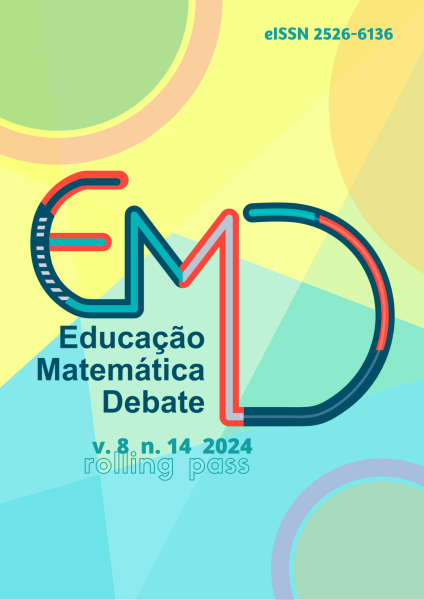A pesquisa em Educação Matemática: possibilidades de feitura e apreciação dos dados sob a perspectiva dos estudos antropológicos
DOI:
https://doi.org/10.46551/emd.v8n14a09Palavras-chave:
Metodologias Críticas, Epistemologias Plurais, Feitura e Apreciação dos Dados, Perspectiva AntropológicaResumo
A reflexão apresentada neste ensaio teórico propõe repensar metodologias de pesquisa em Educação Matemática sob uma perspectiva antropológica, promovendo a feitura e apreciação dos dados em oposição à tradicional coleta e análise, propondo uma Educação Matemática mais sensível à diversidade cultural e contribuindo para uma epistemologia plural e contextualizada. Inspirado por uma visão crítica e decolonial, enfatiza-se a importância de métodos como a observação participante, narrativas e etnografias que permitem captar a complexidade cultural e social. Esse movimento visa contribuir para uma Educação Matemática enraizada na diversidade, valorizando a pluralidade de saberes culturais e incentivando o diálogo entre conhecimentos escolares e práticas locais. Assim, promove-se uma educação mais democrática, transformadora e conectada às realidades sociais dos estudantes.
Downloads
Referências
BARROS, Liana Cézar; BAUMANN, Ana Paula Purcina; RIBEIRO, José Pedro Machado. Os povos indígenas brasileiros nos livros didáticos de Matemática dos Anos Iniciais do Ensino Fundamental. Educação Matemática Debate, v. 7, n. 13, p. 1-23, 2023. https://doi.org/10.46551/emd.v7n13a19
BISHOP, Alan John. Mathematics Education and cultural diversity. Educational Studies in Mathematics, v. 19, n. 2, p. 179-191, may 1988. https://doi.org/10.1007/BF00751231
BOAS, Franz. Race, language, and culture. Chicago: The University of Chicago Press, 1928.
CASTRO-GÓMEZ, Santiago. La poscolonialidad explicada a los niños. Popayán: Editorial Universidad del Cauca, 2005.
CLIFFORD, James. A experiência etnográfica: Antropologia e literatura no século XX. Tradução de Patrícia Farias. 2. ed. Rio de Janeiro: EdUFRJ, 2002.
CLIFFORD, James. Writing culture: the poetics and politics of ethnography. Berkeley: University of California Press, 1986.
D’AMBROSIO, Ubiratan. Etnomatemática: um programa. São Paulo: Autêntica, 2002.
ESCOLAR, Arturo. Encountering development: the making and unmaking of the Third World. Princeton: Princeton University Press, 2003.
FREIRE, Paulo. Pedagogia do oprimido. Rio de Janeiro: Paz e Terra, 1987.
GEERTZ, Clifford. A interpretação das culturas. Tradução de Fanny Wrobel. Rio de Janeiro: LTC, 1989.
GONÇALVES, Harryson Júnio Lessa; SANTANA, Marcela Lopes; MARTINS, Igor Micheletto; SOUZA, Carla Araujo; SCIARINI, Arthur Henrique. Manifesto por uma Antropologia da Educação Matemática. Revemat, v. 19, p. 1-21, 2024. https://doi.org/10.5007/1981-1322.2024.e97208
LAPLANTINE, François. Aprender antropologia. Tradução de Marie-Agnès Chauvel. São Paulo: Brasiliense, 2000.
LARAIA, Roque de Barros. Cultura: um conceito antropológico. 14. ed. Rio de Janeiro: Jorge Zahar, 2001.
MALINOWSKI, Bronisław Kasper. Argonautas do Pacífico Ocidental: um relato do empreendimento e da aventura dos nativos nos arquipélagos da Nova Guiné melanésia. Tradução de Anton P. Carr e Lígia Aparecida Cardieri Mendonça. São Paulo: Abril Cultural, 1978.
MANOEL, Alan Pereira; CORADETTI, Camila Aparecida Lopes. Um olhar sobre as questões étnico-raciais nas enunciações sobre a história da Matemática apresentadas pelos livros didáticos de Matemática do Ensino Médio aprovados pelo PNLD 2018. Educação Matemática Debate, v. 3, n. 9, p. 267-281, set./dez. 2019. https://doi.org/10.24116/emd.v3n9a04
MENDES, Iran Abreu; FARIAS, Carlos Aldemir (Org.). Práticas Socioculturais e Educação Matemática. São Paulo: Livraria da Física, 2014.
MENDES, Iran Abreu; FARIAS, Carlos Aldemir. Práticas socioculturais e aprendizagem da cultura. Rematec, v. 18, n. 45, p. 2-6, 2023. https://doi.org/10.37084/REMATEC.1980-3141.2023.n45.pe2023001.id540
MIGNOLO, Walter. La idea de América Latina: la herida colonial y la opción decolonial. Barcelona: Gedisa Editorial, 2007.
MIGNOLO, Walter. The darker side of western modernity: global futures, decolonial options. Durham: Duke University Press, 2009.
MORGAN, Lewis. Ancient society. New York: Henry Holt and Company, 1877.
OLIVEIRA, Roberto Cardoso. O trabalho do antropólogo. São Paulo: EdUnesp, 2000.
QUIJANO, Aníbal. Colonialidade do poder, eurocentrismo e América Latina. In: LANDER, Edgardo (Org). A colonialidade do saber: eurocentrismo e ciências sociais. Perspectivas latino-americanas. Buenos Aires: CLACSO, 2005, p. 117-142.
ROCHA, Gilmar. A etnografia como categoria de pensamento na antropologia moderna. Cadernos de Campo, v. 15, n. 14-15, p. 99-114, 2006. https://doi.org/10.11606/issn.2316-9133.v15i14-15p99-114
STOCKING JR., George W. Observers observed: essays on ethnographic fieldwork. Madison: University of Wisconsin Press, 1983.
TYLOR, Edward Burnett. Primitive culture. Cambridge: Cambridge University Press, [1871] 1920.
YOUNG, Michael; MULLER, Johan. On the powers of powerful knowledge. Review of Education, v. 1, n. 3, p. 229-250, oct. 2013. https://doi.org/10.1002/rev3.3017
Arquivos adicionais
Publicado
Como Citar
Edição
Seção
Licença

Este trabalho está licenciado sob uma licença Creative Commons Attribution-NonCommercial-ShareAlike 4.0 International License.






















